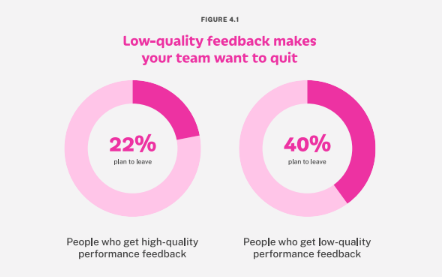Textio: 10% of all employee attrition is caused by low quality feedback
Here’s how to be better at performance reviews and feedback, and drive up retention in your organization, according to Textio’s Co-Founder and Chief Scientist Emeritus Kieran Snyder.
News In Brief
Organizations are losing employees because of bad feedback - interestingly, it is the quality of the feedback, not whether it was negative or positive, that leads to high attrition.
That's according to three years' worth of data from Textio, a global feedback platform.
UNLEASH got the inside track on the data, and how to solve this problem, from Textio's Co-Founder and Chief Scientist Emeritus Kieran Snyder.
Productivity and performance are key focus for businesses across the world.
Getting the most of our people, and avoiding high attrition rates, is essential – especially in a challenging labor market where supply is still not meeting demand, as McKinsey data showed.
However, new data from performance tech giant Textio shows that employers are still missing the mark. They aren’t making the most of feedback cycle and performance reviews, which is impacting employee engagement and retention.
Based on analysis of 13,000 employee performance reviews on its platform, Textio’s 2023 data shows that when it comes to predicting talent attrition and retention, it is the quality of feedback that matters, not whether the feedback was positive or negative.
In fact, 10% of all attrition is caused by low quality feedback. Plus, people who get low-quality feedback in annual performance reviews are 63% more likely to quit their jobs in the next year.

Credit: Textio.
The problem is particularly acute for high performers, who make up up to 15% of the workforce, and retention of whom is business critical for employers globally.
Texito’s 2024 data, which analyzed 23,000 performance reviews and surveyed 450 individuals globally, found that high performers get 1.5x more feedback, but they are getting the lowest quality of feedback.
However, when high performers get low quality feedback, they are more likely to quit and find a new job (and quickly).
How to switch feedback from low to high quality
It is clear that quality of feedback needs to be improved to drive up engagement and retention, but what makes performance reviews low quality and problematic?
It is feedback that is exaggerated, personality focused (rather than about performance), vague and doesn’t include actionable changes for employees to make.
Not only is this feedback frustrating and unhelpful, but Textio’s research shows that it actually confirms biases and stereotypes.
Textio’s 2022 data, which analyzed 25,000 individual’s performance reviews from 250 organizations, shows that women get 22% more feedback about their personality, not their work, than men, and they received twice as much unactionable feedback than men.
High performance women get 38% more problematic feedback than men, and they are seven times more likely to internalize those negative stereotypes.
Not even being the highest performer exempts women from paying the personality tax. High-performing women get exactly as much personality feedback as their lower-performing peers”, stated the 2024 report from Textio.
Speaking to UNLEASH, Textio Co-Founder and Chief Scientist Emeritus Kieran Snyder shares: “Regardless of performance level, people are more likely to internalize feedback that aligns with social stereotypes about their identity.
“This creates a disproportionate disadvantage for people from the underrepresented groups that have been most heavily penalized with negative stereotypes.
“For instance, 78% of women recall being described as emotional at work, compared with just 11% of men.
“On the other hand, only 19% of women recall being described as likable, compared with 71% of the men.”

Credit: Textio.
These feedback biases don’t just play out around gender, they also perpetuate racial stereotypes.
Textio’s data also shows that Black workers receive twice as much unactionable feedback as white or Asian coworkers, while more than six in ten Hispanic and Black people recall being negatively described as emotional (compared to 21% of race people).
The question that remains is how can employers, and especially managers and HR leaders who oversee these feedback cycles, step up and rethink their approach.
Textio’s Synyder tells UNLEASH: “If you’re an HR leader tasked with supporting managers through the feedback process, you‘ve probably noticed that running trainings once or twice a year hasn’t made much difference to your employee escalations.
“It’s also impossible to scale yourself to work closely with every single manager who needs support.
The only way through is to invest in tools that help managers spot their own biases in real time.”
Sign up to the UNLEASH Newsletter
Get the Editor’s picks of the week delivered straight to your inbox!

Chief Reporter, UNLEASH
Allie is an award-winning business journalist and can be reached at alexandra@unleash.ai.
Contact Us
"*" indicates required fields
Partner with UNLEASH
"*" indicates required fields